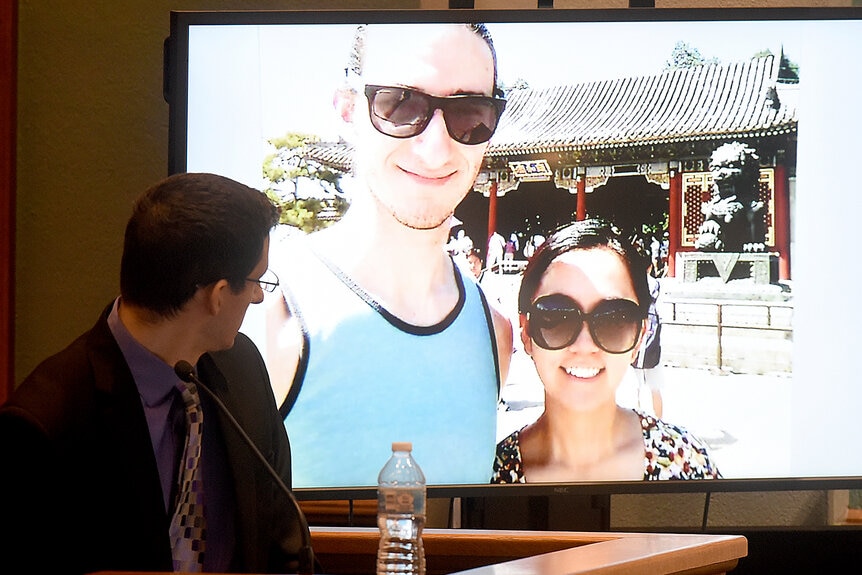Create a free profile to get unlimited access to exclusive videos, breaking news, sweepstakes, and more!
Missouri Man Convicted Of Murdering Wife He Reported Had Gone Missing
Joseph Elledge, who killed his wife and buried her remains in a state park, avoided a possible death sentence after conviction on a lesser charge, but will likely spend decades in prison.
A Missouri man charged with first-degree murder in the death of his wife was convicted on lesser charges on Thursday, after taking the stand in his own defense.
Joseph Elledge, 26, was charged in February 2020 with first-degree murder in the October 2019 death of his wife Mengqi Ji Elledge, 28. But, after a two-week trial in which Elledge testified that he'd accidentally killed his wife during a physical altercation before burying her body as the couple's infant sat in their car, the jury acquitted him of first-degree murder in favor of second-degree murder after seven hours of deliberations, according to the Associated Press.
Missouri law says that first-degree murder requires the perpetrator to have knowingly killed his victim "after deliberation on the matter," while second-degree murder requires only that that perpetrator have knowingly killed their victim or, in an attempt to seriously injure their victim, caused their death. The jury also considered and rejected both voluntary and involuntary manslaughter charges (the first requires the death be caused "under the influence of sudden passion arising from adequate cause," while the second requires either a perpetrator's reckless or negligent behavior to have cause the death.)
A conviction for first-degree murder requires a sentence of either the death penalty or life in prison without the possibility of parole. After convicting Elledge of second-degree murder Thursday, the jury recommended a sentence of 28 years after 90 minutes of further deliberation, according to NBC affiliate KOMU in Columbia, Missouri.
Mengqi Ji's last contacts with anyone other than her husband were on Oct. 8, 2019, when she had her daily video chat with her mother and made arrangements to pick up baby formula for the couple's daughter, Anna, according to a probable cause affidavit. She never called her mother again and never arrived to get the formula.
Elledge talked to several people the following day, but never mentioned his wife was gone; in later interviews with police — during which he also complained that it had been increasingly common for his wife to refuse to have sex with him — he said they'd gone to bed at different times on Oct. 8 and he'd woken up on the morning of Oct. 9 to Anna's crying and his wife gone. He told police he'd gone for two drives with Anna that day to calm down; their review of his GPS data suggested he lied about the locations.
Elledge did not report his wife missing until the afternoon of Oct. 10, after Mengqi Ji's mother sent a friend to the house to check on her daughter because she'd missed their daily phone call on Oct. 9.
In testimony at his trial, Elledge admitted the couple had a physical altercation on the evening of Oct. 8, according to the Associated Press. He said they had argued about her sexting with a man from China on the Chinese-based messaging service WeChat — he later alleged in an interview after her disappearance that she'd been having an affair, though testimony reported by Columbia Daily Tribune suggests the relationship existed only online.
Elledge testified that he'd given his wife a massage in order to initiate sex that night, but that, when he attempted to undress her, she stopped him, according to the Daily Tribune; he then began yelling at her about the online affair, which he'd learned of by translating her messages. After some period of yelling, Elledge testified that he told Ji that he was going to leave and take their daughter, and that she pushed him as he attempted to go to Anna's bedroom.
Ji, court records reflect, was 5 feet tall and around 100 pounds, while Elledge is six feet tall and around 170 pounds.
Elledge testified that he pushed his much-smaller wife in response, and her body hit the kitchen cabinets. When she continued to try to prevent him from taking their daughter, he testified, he pushed her again, at which point she fell and hit her head.
Elledge testified that he helped his wife up, got her to the couch and left the apartment without their daughter, returning after 45 minutes. Ji, he said, was no longer on the couch, so he watched YouTube until 11:30 p.m. When he went to the couple's bed, he testified that Ji was lying on it, apparently asleep — albeit with her shoes still on.
He didn't wake her.
Elledge claimed on the stand that, when Anna woke him up the next morning about 5:00 a.m. CST, Ji didn't stir and, once he'd checked on their daughter, he tried to wake Ji, only to find she was cold and unresponsive.
Instead of calling 911, Elledge testified that he carried Ji's body out to her own car and placed her in its trunk before sunrise.
According to the probable cause affidavit, police knew that Elledge took two drives that day. One in the morning, when he drove 30 miles south to Jefferson City and back around 10:30 a.m., and another around 6:30 p.m. — half an hour before sunset — 15 miles south to Ashland, 10 miles east to Guthrie, back to Ashland, then northwest of Columbia to several stops along the MKT/Katy Trail, including Rocheport, Boonville (which is 12 miles west) and then another 9 miles west to outside Lamine, near the intersection of Route 41 and the Lamine River. That is where police had initially focused their search for Ji's remains.
Elledge testified at his trial that he was, in fact, looking for a place to bury his wife, but could not decide on one. So, he said, he left her body in the trunk of her car overnight.
But after Ji's friend came by the house and Elledge talked to Ji's mother, he testified that decided he had to carry out his plan to bury the body of the wife he had killed. So, with their daughter in the car, Elledge stated that drove a mere five miles south to Rock Bridge State Park, where he had initially proposed to Ji. There, half a mile from the spot where they got engaged, Elledge said he spent 30 to 45 minutes burying his wife's body.
He never told police where his wife's body was. A hiker, Steven Roberts, testified that he noticed a purse sticking out of the ground near a group of juniper trees while hiking in March 2021, according to the Daily Tribune. He poked at it and discovered her bones as well. Given the state of Ji's remains, authorities were unable to determine a definitive cause of death, but a forensic anthropologist testified that Ji also had recently broken ribs at the time of her death, according to the Daily Tribune.
At trial, recordings the couple made of their fights, as well as Elledge's diary were introduced as evidence of Elledge's grievances with his wife and his violent temper. He suggested that Ji's mother needed to be treated violently, according to the Daily Tribune, angry that she and her family would communicate in Chinese (which he didn't speak) when they visited after Anna was born, and asserted to his own mother that he had the right to beat his wife, according to KOMU. He was initially arrested in October 2019 — after Ji's disappearance but before he was charged in her murder — on child abuse charges after authorities allegedly discovered evidence on Ji's devices that he'd beaten their daughter, Anna, when she was 4 months old because, he said, she wouldn't stop crying.
Ji's remains are still in the United States, according to an attorney for Ji's family, and there is still the question of custody of Anna as well as Ji's assets to sort out, according to the Daily Tribune. Ji was the sole source of financial support for her and Elledge when he murdered her, according to the paper.





























